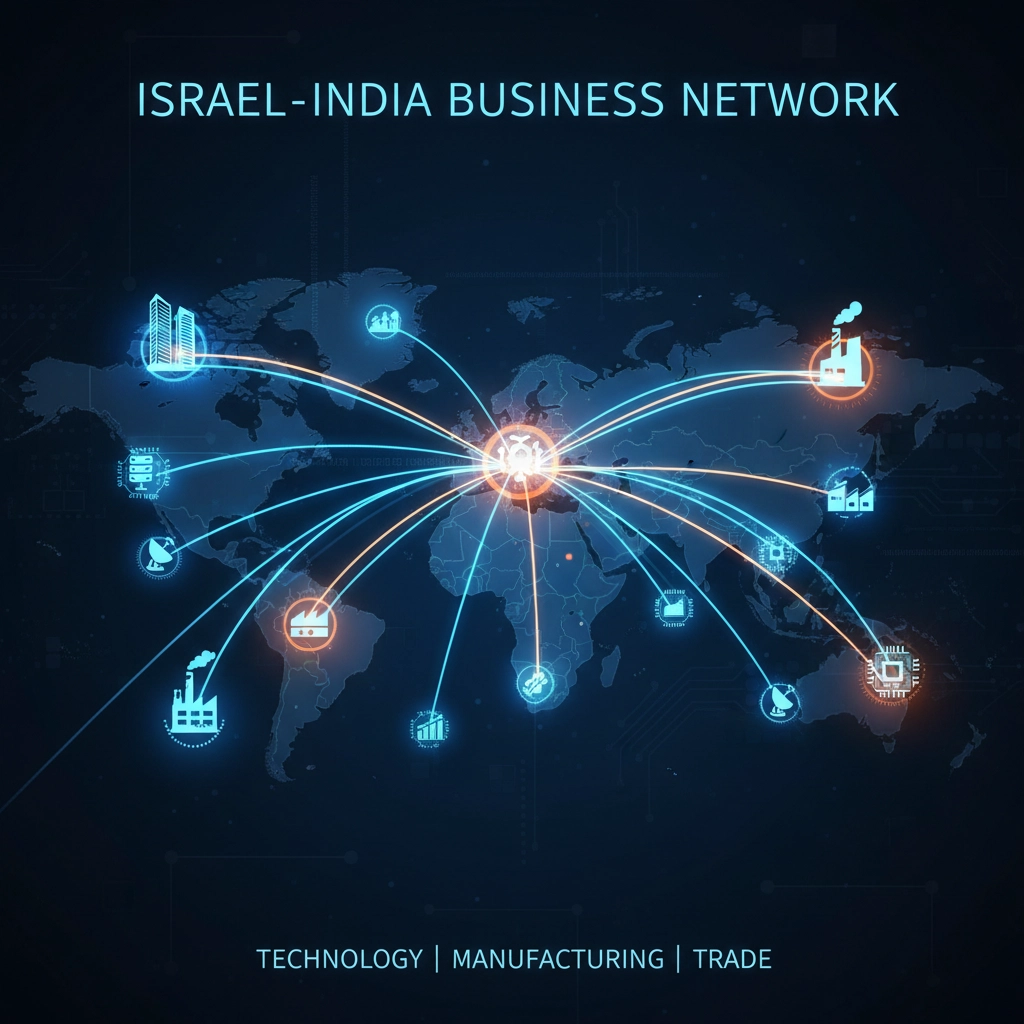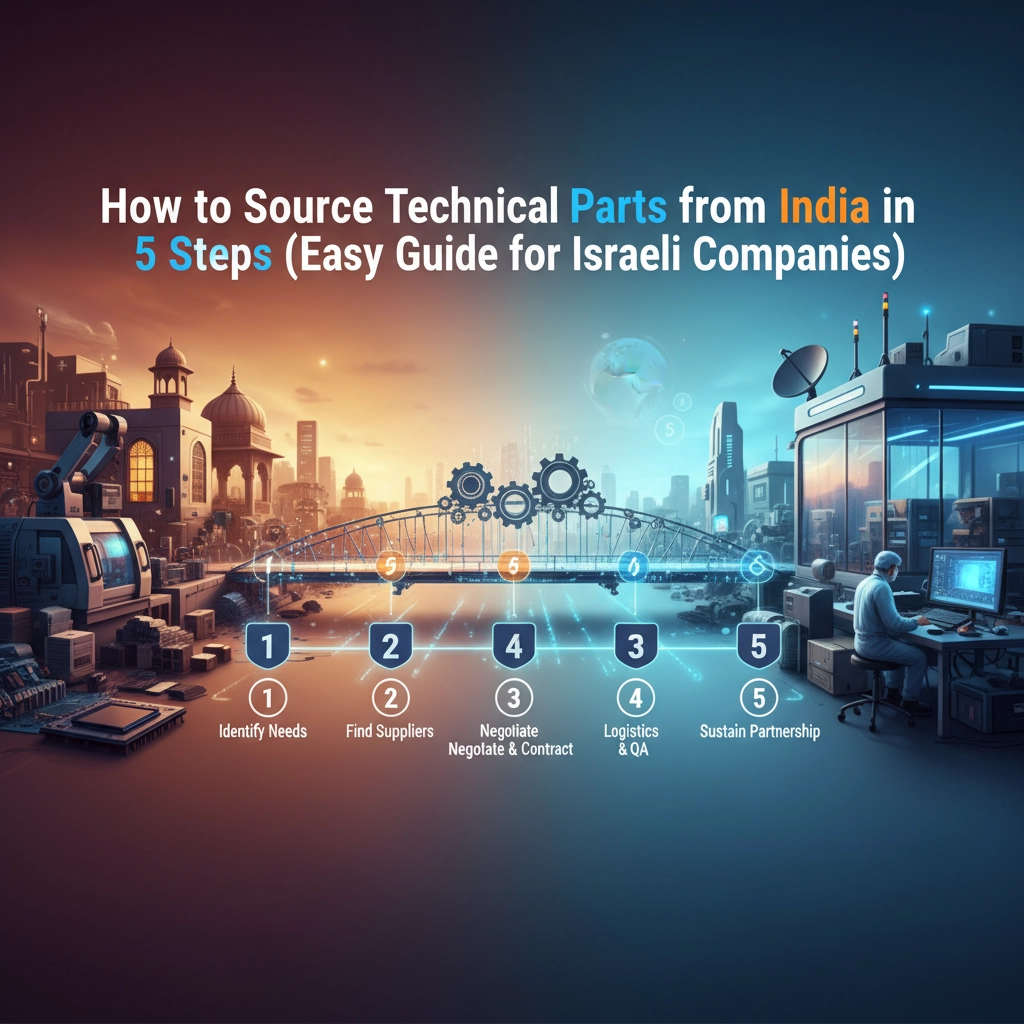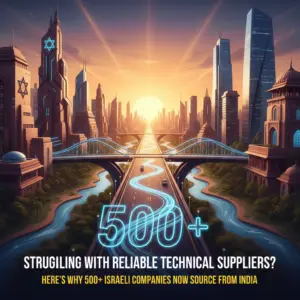Looking to source technical parts from India? You're not alone. More Israeli companies are discovering that India offers incredible opportunities for high-quality technical components at competitive prices. With India's booming electronics market expected to hit $300 billion by 2026 and a strong Israel-India partnership framework in place, now's the perfect time to explore these possibilities.
But here's the thing – successful sourcing isn't just about finding the cheapest supplier. It's about building reliable partnerships that deliver quality, consistency, and long-term value. Let's break down exactly how to do this right.
Step 1: Tap Into Government-Backed Partnership Programs
Start with the big advantage you have as an Israeli company – the India-Israel Industrial R&D and Technological Innovation Fund (I4F). This isn't just bureaucratic paperwork; it's real money that can kickstart your sourcing relationships.
The I4F offers Israeli companies between $250,000 to $1.25 million per project, covering up to 50% of your Israeli project costs. That's substantial backing for establishing supplier relationships and joint development projects.

Here's what makes this program particularly useful for technical parts sourcing:
Feasibility Studies: Test potential supplier relationships with financial backing before making big commitments.
R&D Projects: Collaborate with Indian suppliers on developing custom technical solutions that meet your exact specifications.
Pilot Projects: Scale successful partnerships with proven suppliers.
Strategic Projects: Access grants up to $5 million for major supply chain initiatives.
The program runs through 2027, so you have a solid window to establish these government-backed relationships. With thirty-four projects already completed across various technical sectors, there's a proven track record of success.
Step 2: Connect Through Established Business Networks
Don't go it alone. India has over 50 tech companies actively seeking Israeli partnerships, backed by a $40 million joint fund. The bilateral relationship creates natural networking opportunities you should leverage.
Focus on connecting with companies that already understand Israeli business culture and quality expectations. Many major players like Intel and NVIDIA already have successful operations in India, which means established supply chains and quality standards exist.

Key networking channels include:
- Trade missions and bilateral business forums
- Indian IT firms like Wipro, TCS, and HCL that already work with Israeli semiconductor companies
- Industry associations focused on electronics and technology manufacturing
- Regional trade offices that facilitate Israel-India business connections
The beauty of working through these networks is that they've already done much of the relationship-building groundwork. You're not starting from scratch – you're plugging into established partnerships that understand both markets.
Step 3: Target India's Manufacturing Strengths
Not all technical parts are created equal, and not every supplier can deliver what Israeli companies need. Focus your sourcing efforts where India truly excels and where quality meets your requirements.
India's semiconductor market is projected to reach $110 billion by 2030, with one-fifth of the world's semiconductor designers being Indian. This isn't just about cost savings – it's about accessing world-class technical capabilities.
Prime areas for sourcing include:
Semiconductor Components: India's investing heavily in fabrication facilities, creating opportunities for production partnerships that reduce costs while maintaining quality.
Defense and Security Tech: Through "Make in India" initiatives, suppliers are developing advanced sub-systems that meet international standards.
Electronic Components: With a massive pool of highly skilled engineers, India produces high-quality technical components for global markets.

The key is matching your specific needs with suppliers who have proven capabilities in your sector. Don't assume all suppliers are the same – India's technical manufacturing ecosystem is sophisticated and specialized.
Step 4: Establish Robust Supplier Verification
Quality control isn't optional when sourcing technical parts. Your Israeli customers expect reliability, and your reputation depends on it. That means implementing thorough supplier verification from day one.
Here's your verification checklist:
Facility Audits: Visit potential suppliers in person or through trusted representatives. Photos and videos aren't enough for technical components.
Quality Certifications: Verify ISO certifications, industry-specific standards, and quality management systems. Don't just ask – independently verify.
Reference Checks: Contact existing clients, particularly other international customers. Ask specific questions about delivery times, quality consistency, and problem resolution.
Financial Stability: Technical parts often require ongoing relationships. Ensure your suppliers have the financial stability to support long-term partnerships.
Consider working with specialized sourcing companies that understand both Israeli quality expectations and Indian manufacturing capabilities. They can provide quality assurance services and help minimize risks while you build direct relationships.
Testing Protocols: Establish clear incoming inspection procedures, performance monitoring systems, and corrective action processes before you need them.
Step 5: Build Strategic Partnerships, Not Just Supplier Relationships
The most successful Israeli companies sourcing from India think beyond traditional buyer-supplier relationships. They build strategic partnerships that create mutual value and long-term stability.
Indian tech companies are specifically looking for:
- Joint technology development opportunities
- Collaborative R&D initiatives
- Long-term strategic relationships
- Technology transfer partnerships

This approach offers several advantages:
Stability: Partners are less likely to suddenly change terms or quality standards compared to transactional suppliers.
Innovation: Joint development creates technical solutions specifically designed for your needs rather than off-the-shelf components.
Market Access: Strategic partnerships can help you access broader Indian markets while securing your supply chain.
Risk Mitigation: Deeper relationships mean better communication and faster problem resolution when issues arise.
Consider establishing a local presence in India, following successful models like Israel Aerospace Industries (IAI), which opened operations in New Delhi to support innovation and build technology capabilities with local partners.
Supply Chain Integration: The most effective partnerships integrate Israeli innovation with Indian manufacturing scale, creating supply chains that leverage both nations' strengths.
Making It Work in Practice
Successful technical parts sourcing from India isn't about finding the cheapest option – it's about building reliable partnerships that deliver consistent quality at competitive prices. The Israel-India relationship provides unique advantages, but you need to approach it strategically.

Start with government programs to reduce your risk and get financial support. Use established networks to find pre-vetted partners. Focus on India's manufacturing strengths where quality meets your requirements. Implement thorough verification processes to ensure consistency. And most importantly, think partnership, not just procurement.
The companies getting this right are building supply chains that combine Israeli innovation with Indian manufacturing capabilities. They're not just cutting costs – they're creating competitive advantages that position them for long-term success.
With India's electronics market booming and the bilateral relationship stronger than ever, Israeli companies have a unique window of opportunity. The question isn't whether to explore Indian sourcing – it's how quickly you can establish the partnerships that will drive your business forward.




